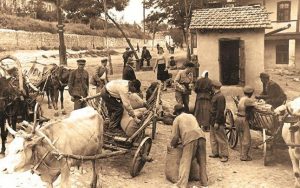CEREES Lecture and Archive Talk
Wednesday 8 May, 2024, 18:00-20:00
Soviet Famine in Moldova:
Why was the Soviet famine of 1946-7 the most severe in the Moldavian SSR? Preliminary conclusions based on Chișinău, Kyiv, and Moscow archives
Igor Cașu
(National Agency for Archives, State University of Moldova)


Venue: Montagu Lecture Theatre, Graduate Centre (GC601), Queen Mary University of London, Mile End Road London E1 4NS
Book here: Eventbrite
About the Event:
The Soviet famine of 1946-1947 is the last and the least researched famine in the USSR’s history. The reference books on the postwar famine are outdated conceptually and empirically (Zima, 1996) or limited mainly to the international context (Ganson, 2009). As a few recent books or articles on the Soviet famine of 1931-1933 show (Ohayon (2006), Kindler (2018), Cameron (2018), and Pianciola (2019), the clue to understanding the famine phenomena is to address the regional dimension and embark on a multidisciplinary approach. For at least one-quarter of a century, it is acknowledged that the Soviet postwar famine was the most severe proportionally in the Moldavian SSR. Ten times more people died, proportionally, in present-day Moldova than in Russia, and five times more than in Ukraine (Ellman, 2000). Igor Cașu uses unpublished archival materials from Moldova, Ukraine, and Russia to explain why according to the three main indicators of the famine – dystrophy, excess deaths, and cannibalism – it was most devastating in the Moldavian SSR, indeed in the historical Bessarabia, including in areas given to Ukraine, in the north, and especially south, in the strategically important areas on the Black Sea coast and Danube mouths.
Igor Cașu’s opening lecture will be followed by an archive talk on using the National Archives of Moldova, Ukraine, and Russia, drawing on his experience as Director of the National Agency for Archives at State University of Moldova.
About the Speaker:
Igor Cașu is the director of the National Agency for Archives, since April 2022, and a Lecturer at the State University of Moldova, Chișinău, since September 1998. He defended his Ph.D. thesis in March 2000 at the Iași University in Romania on “Nationalities policy in Soviet Moldavia, 1944-1989”. From January to June 2010, he was deputy chairman of the Presidential Commission for the Study of Communist Totalitarian Regine in the Republic of Moldova in charge of research on “Political Repressions from 1953 to the late 1980s”. In February-August 2016 he was a Fulbright Scholar at Stanford University giving talks on postwar famine at Toronto University, Yale, Harvard, and Stanford. In March 2020 he was NEC Visiting Scholar at Davis Center, Harvard University. His recent publications include “The Benefits of Comparison: Famine in Kazakhstan in the Early 1930s in Soviet Context”, in Journal of Genocide Research, Volume 22, issue 3, 2020, and “Do Starving People Rebel? Hunger Riots as Bab’y Bunty in Spring 1946 Soviet Moldavia”, in New Europe College’s Yearbook (Bucharest), 2020 and “Police vs. Party? Institutional Hierarchies and Agency in Soviet Moldavia, 1944-1952”, in Contemporary European History, vol. 32, no. 1, 2022. He is working on a book on the postwar famine in Soviet Moldavia in the European context, 1946-47.

Event outline:
Welcome and introduction – 18:00
Lecture: Soviet Famine in Moldova – 18:10
Moldavian Archive overview – 18:40
Q&A, chaired by Natalaya Chernyshova (QMUL) – 18:50
Drinks reception, meet the speaker – 19:10